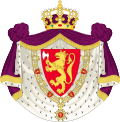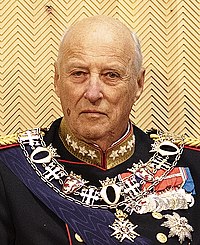
Back ملكية النرويج Arabic ملكية النرويج ARZ Norská monarchie Czech Norwegische Monarchie German Monarquía de Noruega Spanish Norra kuningas Estonian Norjan hallitsija Finnish Monarchie norvégienne French המלוכה הנורווגית HE Monarki Norwegia ID
| His Majesty the King of Kingdom of Norway | |
|---|---|
| Norges konge (Bokmål) Noregs konge (Nynorsk) | |
 | |
| Incumbent | |
 | |
| Harald V since 17 January 1991 | |
| Details | |
| Style | His Majesty |
| Heir apparent | Crown Prince Haakon |
| First monarch | Harald Fairhair |
| Formation | c. 872 |
| Residence | Royal Palace in Oslo |
| Website | The Norwegian Monarchy |
 |
|---|
| Constitution |
|
|
The Norwegian monarch is the head of state of Norway, which is a constitutional and hereditary monarchy with a parliamentary system. The Norwegian monarchy can trace its line back to the reign of Harald Fairhair and the previous petty kingdoms which were united to form Norway; it has been in unions with both Sweden and Denmark for long periods.
The present monarch is King Harald V, who has reigned since 17 January 1991, succeeding his father, Olav V. The heir apparent is his only son, Crown Prince Haakon. The crown prince undertakes various public ceremonial functions, as does the king's wife, Queen Sonja. The crown prince also acts as regent in the king's absence. There are several other members of the royal family, including the king's daughter, grandchildren and sister. Since the dissolution of the union between Norway and Sweden and the subsequent election of a Danish prince as King Haakon VII in 1905, the reigning royal house of Norway has been a branch of the Schleswig-Holstein-Sonderburg-Glücksburg branch of the House of Oldenburg; originally from Schleswig-Holstein in Germany,[1] agnatically (through Prince Philip) the same royal house as the British (since the accession of Charles III), Danish and former Greek royal families.
Whilst the Constitution of Norway grants important executive powers to the King, these are almost always exercised by the Council of State in the name of the King (King's Council, or cabinet). Formally the King appoints the government according to his own judgment, but parliamentary practice has been in place since 1884. Constitutional practice has replaced the meaning of the word King in most articles of the constitution from the king personally to the elected government. The powers vested in the monarch are significant but are treated only as reserve powers and as an important security part of the role of the monarchy.
The King does not, by convention, have direct participation in government. He ratifies laws and royal resolutions, receives and sends envoys from and to foreign countries, and hosts state visits. He has a more tangible influence as the symbol of national unity. The annual New Year's Eve speech is one occasion when the King traditionally raises negative issues. The King is also Supreme Commander of the Norwegian Armed Forces and Grand Master of the Royal Norwegian Order of St. Olav and of the Royal Norwegian Order of Merit.[2] The King has no official role in the Church of Norway, but is required by the Constitution to be a member.
- ^ Official royal house web site Archived 10 November 2007 at the Wayback Machine Retrieved 5 November 2007
- ^ Royal House web site on the orders and medals Archived 17 March 2005 at the Wayback Machine Retrieved 21 November 2006